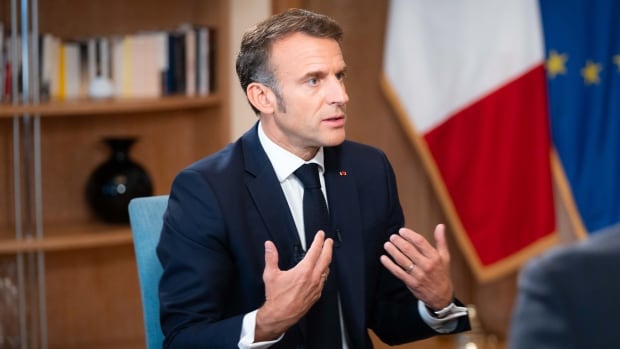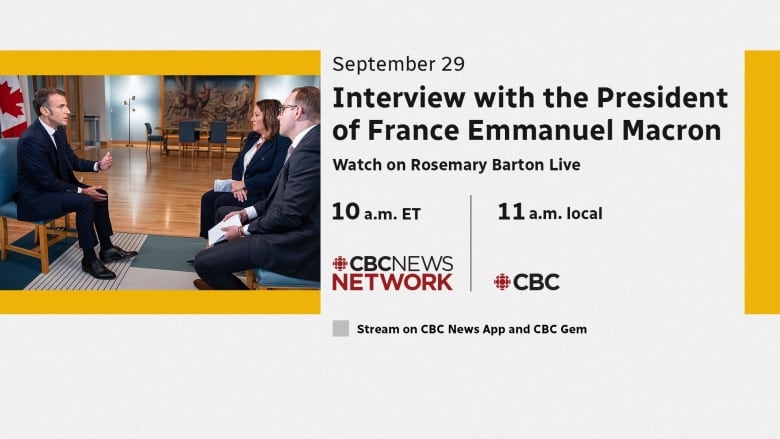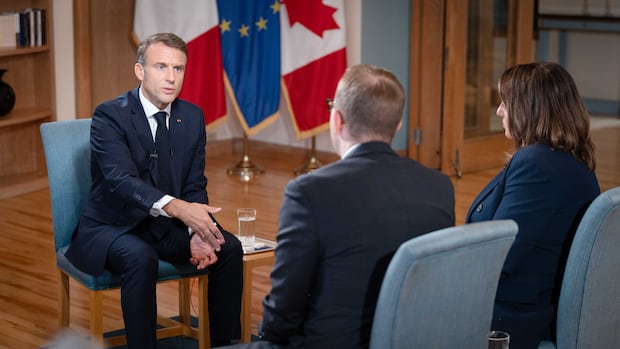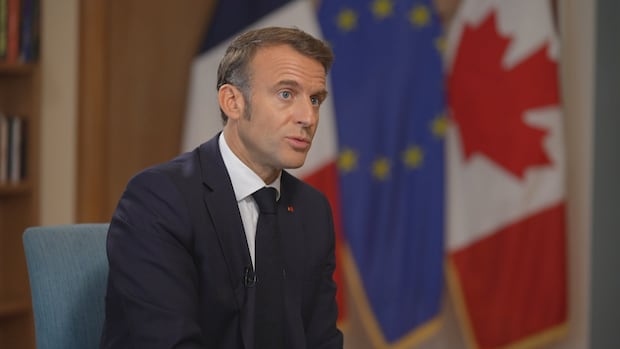
While French President Emmanuel Macron acknowledges that he — like Prime Minister Justin Trudeau — is facing sliding poll numbers and pressure from the political right, he says this is no time for national leaders to abandon their “principles.”
In a wide-ranging interview with CBC News and Radio-Canada last week in Ottawa, before his meeting with Trudeau, Macron said “tough times” are part of the job.
“In political life, in our love life and in life in general, there are times that are not too easy. There are tough times, but that doesn’t mean we have to turn our back on everything and forget about our principles and our ideas,” he told CBC News chief political correspondent Rosemary Barton and Radio-Canada parliamentary bureau chief Louis Blouin.
President of France Emmanuel Macron sits down for an exclusive interview with CBC’s chief political correspondent Rosemary Barton and Radio-Canada’s parliamentary bureau chief Louis Blouin to discuss the global conflict in Ukraine and the Middle East and the political challenges he’s facing as the second longest-serving G7 leader.
“Can we simply turn our backs on climate change? Would that be better? That’s the debate,” he added in French. “Should we totally abandon our values? That’s the debate.”
Trudeau and Macron are now the longest-serving national leaders in the G7. Both leaders are holding on to power as their poll numbers plummet. Trudeau’s government faces what promises to be a series of Conservative non-confidence motions in the House of Commons, while France’s elections in July delivered a hung parliament.
Macron said long-serving leaders who held office during the pandemic should not be surprised by slumping poll numbers.
“Look at all the leaders all over the place,” he said in English. “How many were present during COVID time? We are not so many. Your prime minister was elected in 2015, I was elected in 2017, so it’s normal that, going through all these challenges and crisis, sometimes you have challenging times.”
A challenge from the right
Macron called a snap parliamentary election in July after right-wing parties made significant gains in June’s European Parliament elections, winning twice as much of the vote as Macron’s centrist party.
In the first round of France’s two-stage parliamentary elections, the extreme-right National Rally came first with a third of the votes. After the second round, it stood in third place, winning about a quarter of the 577-seat legislature.
Despite the results, there are parts of France in the de-industrialized north and the agricultural south where the National Rally now dominates.
Here in Canada, the Conservatives now lead the Liberals by almost 43 per cent to 24 per cent, according to CBC’s Poll Tracker.
During an exclusive and wide-ranging interview with CBC News’s chief political correspondent Rosemary Barton and Radio-Canada’s parliamentary bureau chief Louis Blouin, French President Emmanuel Macron said that while he is working with Canada and other countries to stop a possible ground invasion of Lebanon, only the Israeli prime minister and the United States can prevent that from happening.
Macron said voters in France and Canada may be turning to the right because of deep anxiety about the cost of living, migration, their aging populations, the rise of artificial intelligence, climate change and the wars in Gaza and Ukraine.
“We are in a very special period where a lot of people did forget what we did during COVID … to protect our people, our economies, households and so on, and would like to go and live in a better world,” he said.
“We are progressing. It will get better. But in the short run, it’s clear that we are facing this phenomenon. I think it’s quite normal when you’re involved in politics after many years … Our societies were confronted [with] civil big crises and trauma.”
Macron said voters everywhere are putting pressure on their governments to deliver faster results.
“I think we are lucid on the fact that we have to accelerate, and I think Prime Minister Trudeau is very lucid,” he said. “We have to fix some critical issues — employment, cost of life, delivering the climate agenda — because we are, both of us, very committed and we do believe this is the future of our economy.”

You can watch the full interview on Rosemary Barton Live Sunday morning from 10 till noon ET on CBC News Network, and from 11 to noon local on CBC TV.

